Table of Contents
Get started with MyPerfectResume today!
- Build a resume on any device
- Pick an ATS-friendly template
- Tailor with AI copy suggestions
Why this resume works
- Quantifies accomplishments: By including measurable accomplishments like a 15% cost reduction and a $200K annual saving, the applicant exemplifies their impact.
- Highlights industry-specific skills: Industry-specific skills such as cloud computing and network security are part of the applicant’s toolkit, aligning perfectly with roles in tech consulting and IT management.
- Showcases career progression: Progressing from technology consultant to information technology specialist shows the applicant’s increasing responsibility and expertise in optimizing systems and improving security.
More Information Technology Resume Examples
Explore our information technology resume examples to effectively showcase your tech skills and relevant experience. These samples offer guidance for crafting a resume that attracts employers across various IT roles.
Entry-Level Information Technology Resume
Why this resume works
- Effective use of keywords: Using strategic role-relevant keywords like “network security” and “cloud solutions,” the applicant optimizes their resume to successfully navigate ATS.
- Centers on academic background: Early academic excellence shines with degrees in computer science and information technology, setting a strong foundation for the applicant’s budding career in IT.
- Shows digital literacy: Demonstrating computer skills, the applicant’s experience with cloud computing and network security showcases their readiness for modern workplaces.
Mid-Level Information Technology Resume
Why this resume works
- Points to measurable outcomes: By consistently achieving significant improvements like a 40% network speed boost, the applicant showcases their ability to drive measurable outcomes in IT environments.
- Displays technical expertise: Technical prowess is evident through certifications like CISSP and CCNA, combined with hands-on experience in network administration and cybersecurity strategies.
- Demonstrates language abilities: Language skills in Spanish, French, and Chinese strengthen cross-cultural communication, essential for global IT projects.
Experienced Information Technology Resume
Why this resume works
- Lists relevant certifications: Listing certifications like CISSP and PMP reveals the applicant’s dedication to expanding their IT expertise and leadership skills.
- Showcases impressive accomplishments: Tangible contributions, such as saving $25,000 in IT expenses, are impressive accomplishments that highlight the applicant’s ability to deliver substantial business impacts.
- Sections are well-organized: The use of clear bullet points and headers ensures sections are organized logically, making the resume easy to navigate for any reader.
Explore Even More Information Technology Resumes
Information Technology Resume Template (Text Version)
Michael Rodriguez
Dallas, TX 75204
(555)555-5555
Michael.Rodriguez@example.com
Professional Summary
Dynamic Information Technology Specialist with 9+ years of industry experience. Proven track record in optimizing systems to reduce costs and enhance security. Expert in tech consulting and IT project management, driving efficiency and growth.
Work History
Information Technology Specialist
Tech Solutions Group – Dallas, TX
June 2023 – July 2025
- Optimized systems, reduced costs by 15%
- Led IT upgrades, increased efficiency by 20%
- Implemented security protocols, boosted compliance
IT Analyst
Innovative Data Services – Austin, TX
May 2020 – April 2023
- Analyzed data trends, enhanced performance by 30%
- Developed new IT solutions, improved speed by 25%
- Managed IT projects, achieved goals within budget
Technology Consultant
Quantum Tech Advisors – Pinehill, TX
April 2016 – April 2020
- Consulted with clients, optimized IT strategies
- Reduced downtime by 40% through system updates
- Enhanced tech solutions, improved client satisfaction
Skills
- Cloud Computing
- Network Security
- Data Analytics
- IT Project Management
- System Optimization
- Tech Consulting
- Software Development
- Cybersecurity
Education
Master of Science Information Technology
Stanford University Stanford, California
May 2016
Bachelor of Science Computer Science
University of California, Berkeley Berkeley, California
May 2014
Certifications
- Certified Information Systems Security Professional – ISC2
- Cloud Solutions Architect – AWS
- ITIL Foundation – Axelos
Languages
- Spanish – Beginner (A1)
- French – Beginner (A1)
- German – Intermediate (B1)
Browse Resume Examples by Industry
- Aviation
- Banking
- Billing And Collections
- Biology
- Boating
- Business Operations
- Casino
- Chemistry
- Child Care
- Civil Engineering
- Compliance
- Computer Hardware
- Computer Software
- Construction
- Copywriting
- Cosmetology
- Costco
- Culinary
- Customer Service
- Dance
- Data Systems Administration
- Deloitte
- Dentistry
- Driving
- Education
- Electrical
- Electrical Engineering
- Energy
- Engineering
- Entertainment
- Entrepreneur
- Entry Level
- Environmental
- Environmental Science
- Event Planning
- Executive
- Fashion
- Film
- Finance
- Fitness And Nutrition
- Food Service
- Freelancing
- General Laborer
- Goldman Sachs
- Government
- Graphic Design
- Healthcare Support
- Hospitality
- Human Resources
- HVAC
- Industrial Engineering
- Insurance
- Interior Design
- Inventory Management
- Janitorial
- Landscaping
- Language Services
- Law
- Law Enforcement
- Library
- Logistics
- Maintenance
- Marketing
- McKinsey
- Mechanical Engineering
- Mechanics
- Media And Communication
- Medical
- Mental Health
- Meta
- Metal Work
- Military
- Mining
- Museum
- Music
- Netflix
- Non Profit
- Nursing
- Pharmaceutical
- Photography
- Physical Therapy
- Plumbing
- Politics
- Production
- Program Manager
- Project Manager
- Psychology
- Purchasing
- Quality Control
- Real Estate
- Religion
- Retail
- Safety And Security
- Sales
- Sciences
- Shipping
- Social Services
- Special Education
- Sports
- Statistics
- Student
- Teaching
- Team Lead
- Tesla
- Training And Development
- Transportation
- Travel
- Veterinary
- Walgreens
- Walmart
- Web Development
Advice for Writing Your Information Technology Resume
Explore our advice on how to write a resume for an information technology role and discover how to highlight your tech skills, problem-solving abilities, and experience in the IT field.
Whether you’re a software developer, network administrator, or data analyst, we’ve got tailored tips to help you stand out and land your next job.
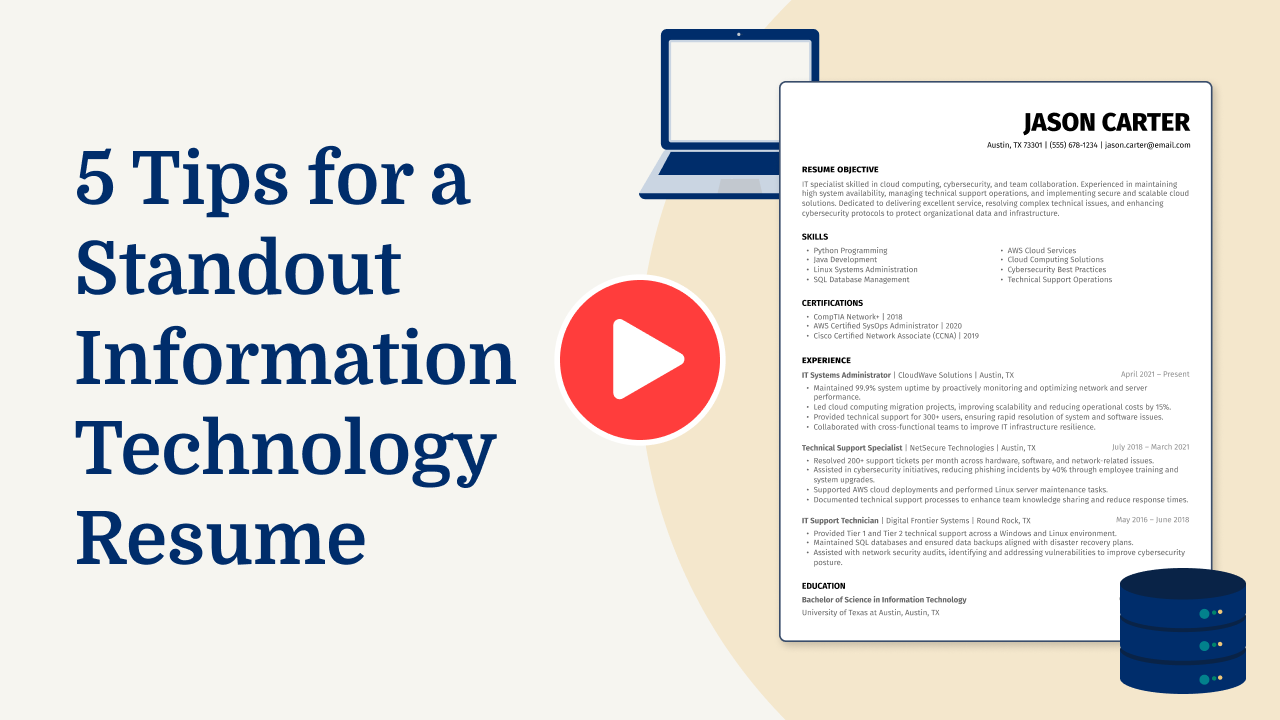
Highlight relevant technical skills
In the world of information technology, technical skills are key. It’s important to have a section on your resume that highlights these skills clearly. You can make a skills section or mention them in your work experience if they fit well there.
This helps show what you can do right away when someone looks at your resume. Technical skills tell employers what tools and technologies you know how to use, which is really important in IT jobs.
When listing technical skills for an IT role, think about what’s needed most often. Some commonly sought-after skills include programming languages like Python or Java, database management with SQL, knowledge of operating systems like Linux or Windows, and understanding networking concepts.
Skills in cloud computing platforms such as AWS or Azure are also helpful. If you have experience with cybersecurity tools or data analysis software, be sure to include those too.
Remember to keep it simple so anyone reading your resume understands what you can do quickly. Tailor the list to match the job description as much as possible, focusing on the skills mentioned there. This way, you’ll stand out as someone ready for the job in information technology.
Example of a technical skills section
- Programming languages (Python, Java, C++)
- Database management (MySQL, MongoDB)
- Cloud computing (AWS, Azure)
- Network administration & security
- Operating systems (Linux, Windows)
- Virtualization technologies (VMware, Hyper-V)
- DevOps tools (Jenkins, Docker, Kubernetes)
- Web development (html5, css3, javascript)
- Version control systems (git, svn)
You can use our AI Resume Builder to craft a resume that highlights technical skills in addition to key soft skills like teamwork, communication, and adaptability.
Quantify your accomplishments
Quantifying accomplishments on your resume can make it stand out by showing exactly what you’ve achieved rather than just listing what you did. In information technology, turning duties into achievements helps paint a clearer picture of your impact.
For example, instead of saying “managed network systems,” you could say “improved network uptime by 20% through proactive monitoring.” This approach not only highlights your skills but also shows potential employers the specific outcomes of your work.
In the work experience section, each entry should start with your job title, followed by the employer’s name, location, and employment dates. Then, use action verbs like “increased,” “reduced,” or “optimized” to describe what you accomplished. Include numbers that show results—like how much money you saved or how much faster a process became.
Using metrics in your descriptions makes your resume more results-driven and easier for hiring managers to assess. It gives them a clear idea of your skills and how you can contribute to their company. Quantified accomplishments not only showcase what you’re capable of but also help set you apart from others who might only list their responsibilities.
5 information technology work history bullet points
- Led a team to implement a cloud-based data storage solution, increasing data retrieval speed by 40%.
- Developed a cybersecurity protocol that reduced security breaches by 25% in the first year.
- Streamlined IT support processes, improving response time by 30% and customer satisfaction scores by 15%.
- Managed network infrastructure upgrades, resulting in a 50% increase in bandwidth capacity.
- Automated routine IT maintenance tasks using scripting languages, saving over 100 hours of manual work annually.
Need some ideas for your resume? Check out our professional resume examples to see how you can show off your skills and experience.
Write a powerful professional summary
A professional summary is a brief introduction at the top of your resume that grabs a hiring manager’s attention. Deciding whether you need a summary or an objective is important. A summary gives an overview of your experience and skills, while an objective states your career goals.
A professional summary is ideal for those with experience. It usually includes three to four sentences highlighting your experience, skills, and achievements. This helps showcase your professional identity and the value you can bring to the job.
Resume objectives are short statements about what you aim to achieve in your career. They work best for entry-level positions, career changers, or people who have gaps in their work history. Unlike summaries that focus on “what I’ve accomplished,” objectives highlight “what I aim to contribute.” We’ll provide examples of both summaries and objectives tailored for different industries and levels of experience.
Information technology resume summary examples
Entry-level
Recent computer science graduate with a Bachelor of Science degree from an ABET-accredited university. Holds CompTIA A+ and Network+ certifications, demonstrating a strong foundation in hardware and networking fundamentals. Eager to apply knowledge in software troubleshooting, system maintenance, and IT support. Enthusiastic about learning new technologies and contributing to team success.
Mid-career
IT specialist with over seven years of experience managing network infrastructure and optimizing systems for medium-sized enterprises. Proven track record in deploying secure networks, overseeing software updates, and resolving complex technical issues. Holds Cisco Certified Network Associate (CCNA) certification, known for streamlining processes that improve operational efficiency and reduce downtime.
Experienced
Senior IT manager with 15+ years of experience driving technology strategies and leading cross-functional teams in Fortune 500 companies. Expertise in cloud computing solutions, cybersecurity frameworks, and enterprise architecture. Led several successful digital transformation initiatives resulting in substantial cost savings and improved system reliability. Committed to fostering innovation and aligning IT goals with business objectives.
Information technology resume objective examples
Recent graduate
Detail-oriented computer science graduate eager to start a career in information technology. Looking to apply strong analytical skills and foundational knowledge of programming languages in a challenging entry-level role, contributing to innovative tech solutions and team success.
Career changer
Dedicated professional pivoting into the field of information technology, armed with substantial experience in problem-solving and project management from previous roles. Excited to bring transferable skills and a passion for tech innovation to an IT support or development position.
Entry-level applicant
Aspiring IT specialist with hands-on training in network administration and cybersecurity, aiming to contribute technical skills and fresh perspectives in a dynamic tech environment. Committed to continuous learning and supporting organizational goals through efficient technology solutions.
Pick a resume template with clear headings and simple fonts, avoiding excessive colors or graphics to ensure employers focus on your work experience, skills, and education without distractions.
Showcase your credentials
Listing your certifications is important in information technology jobs because it shows your skills and knowledge. Certifications like AWS or Google Cloud show that you know how to use these tools well.
Including a certifications section on your resume makes it easy for employers to see what you can do. It’s also good to have this next to your education section so they can see all your learning together. Here are a few examples of relevant certifications to list on your resume:
- AWS Certified Solutions Architect
- Google Professional Cloud Engineer
- Microsoft Certified: Azure Solutions Architect Expert
- Certified Kubernetes Administrator (CKA)
- CompTIA Security+
These certifications help prove you are ready for the job and know the latest technology. Having them on your resume can open more doors in the tech field.
Example of a certifications section
CompTIA A+ Certification
Issued by: CompTIA
Expires 2025
Certified Information Systems Security Professional (CISSP)
Issued by: (ISC)²
Issued 2021
Microsoft Certified: Azure Administrator Associate
Issued by: Microsoft
Expires 2024
Cisco Certified Network Associate (CCNA)
Issued by: Cisco
Issued 2022
Google Professional Cloud Architect
Issued by: Google Cloud
Expires 2023
Use a polished and professional resume format that aligns with your experience level to ensure your skills and qualifications stand out to hiring managers.
FAQ
Do I need to include a cover letter with my information technology resume?
Yes, adding a cover letter to your information technology resume can set you apart from other applicants. A cover letter allows you to show your enthusiasm for the role and company, and you can explore specific projects or skills that match what the company is looking for.
For example, if a company is prioritizing cybersecurity initiatives or embracing new tech like cloud computing, mentioning your experience in these areas can demonstrate you’re a great fit.
To simplify this process, consider using resources like our Cover Letter Generator to craft content based on your resume and career goals.
Additionally, reviewing cover letter examples tailored to IT roles can offer insights into effectively showcasing your skills and experiences to employers.
How long should an information technology resume be?
For an information technology (IT) role, a one-page resume is typically sufficient for most professionals. It allows you to highlight essential skills like programming languages, system administration, and software development.
If you have extensive experience or multiple specialized certifications, a two-page resume can be appropriate. Make sure every detail is relevant to the IT field. Emphasize recent roles—highlighting projects that showcase your technical expertise and problem-solving abilities. Avoid filler content; each point should demonstrate your qualifications effectively.
Explore our guide on how long a resume should be for examples and tips on determining the ideal length for your career stage.
How do you write an information technology resume with no experience?
If you’re crafting an entry-level IT resume and lack direct experience, emphasize your skills, projects, and relevant education to highlight your potential. Here are a few tips on writing a resume with no experience:
- Emphasize technical skills: List any programming languages, software, or tools you’re familiar with. Skills like coding, troubleshooting, and network management can make your resume stand out.
- Highlight education and certifications: Mention any degrees related to IT or computer science, along with relevant courses. Certifications such as CompTIA A+, Cisco CCNA, or AWS Certified Cloud Practitioner can also improve your profile.
- Feature personal projects or internships: If you’ve worked on personal tech projects or completed internships, include these as practical experiences. Describe what you did, the tools used, and the outcomes achieved.
- Showcase soft skills: Communication, problem-solving, and teamwork are important in IT roles. Highlight these qualities through examples from school projects or group activities.
By focusing on these areas, you can effectively demonstrate your readiness for a role in information technology even without formal work experience.
Rate this article
Information Technology
Share this page
Additional Resources

Interview Question: Explaining Complex Information in a Clear Manner
Congrats on getting the interview! As you prepare for the big day, consider practicing common behavioral questions, like: “Could you tell me about a time you had to explain something
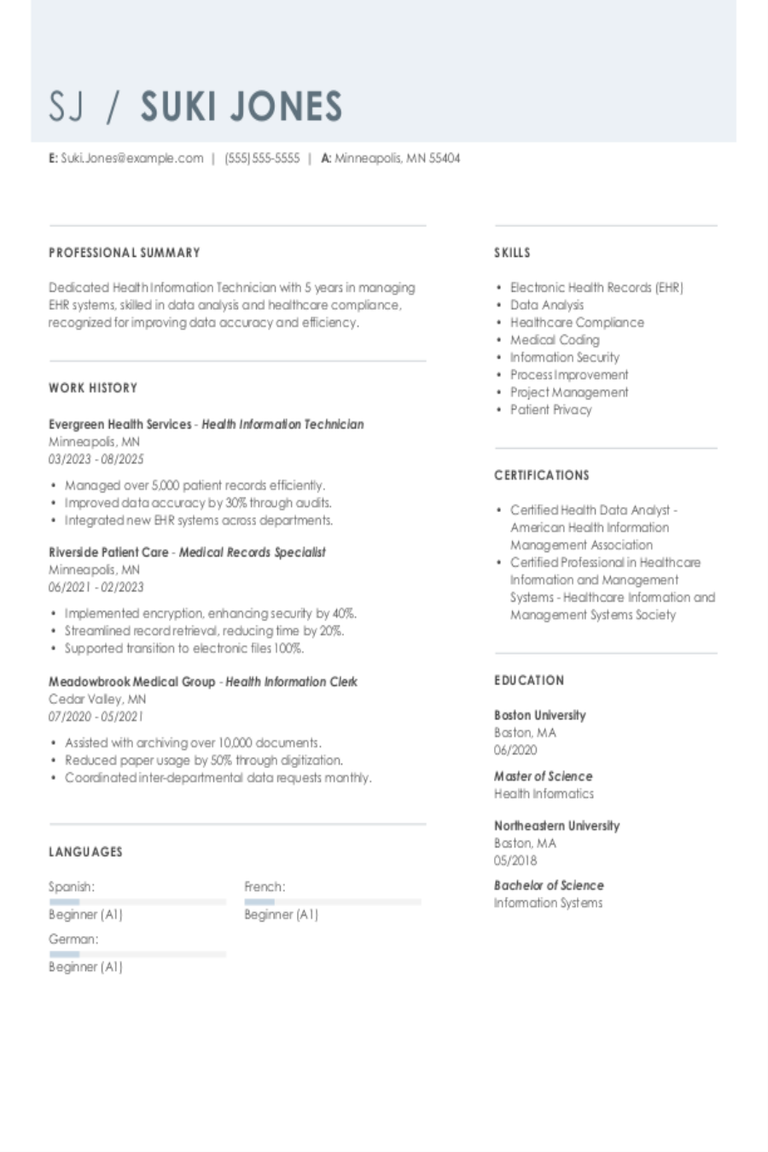
Health Information Technician Resume Examples & Templates
Explore health information technician resume examples that show how to highlight your experience handling patient records, ensuring data accuracy, and maintaining privacy. These examples and tips help you showcase attention
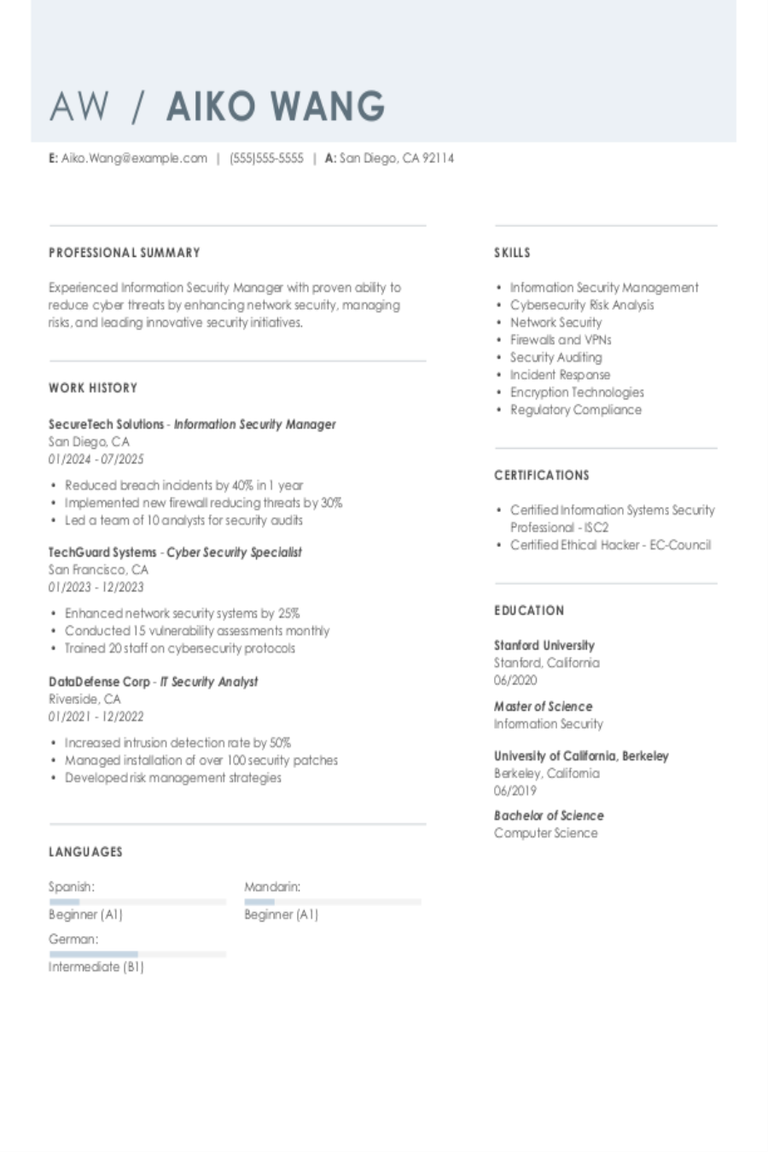
Information Security Manager Resume Examples & Templates
Discover top information security manager resume examples that show you how to highlight your key skills in keeping data safe. Learn how to showcase your experience with security systems and
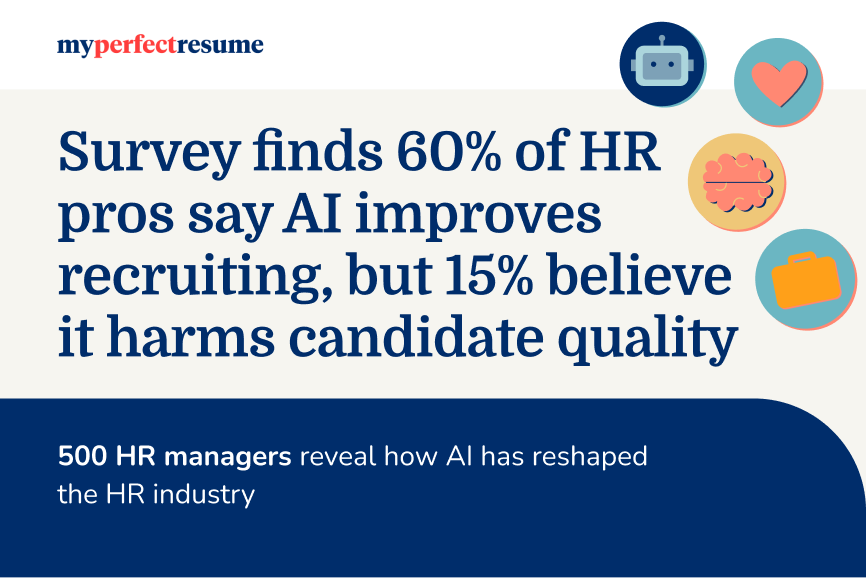
AI in HR Study Finds 64% of HR Managers Embrace the Technology, but Ethical Concerns Remain

The Illusion of Wage Growth: Where Paychecks Stretch the Farthest
U.S. wages have climbed at one of the fastest rates in modern history. Between 2020 and 2024, the average American worker’s pay rose from about $64,000 to $75,600, an 18%
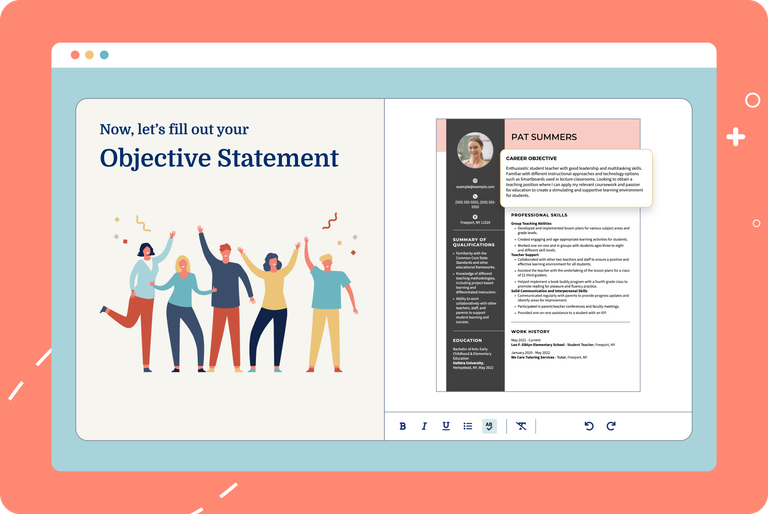
100+ Resume Objective Statement Examples & Best Practices
In just a sentence or two, a resume objective statement tells hiring managers the role or career path you’re aiming for and the unique skills and value you bring to
